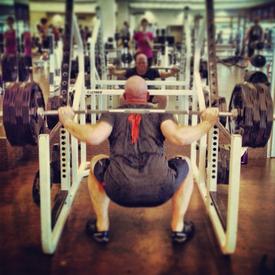Does when you eat matter???

heynow388
Posts: 14 Member
I work the overnight shift so my meal schedule is alot different than most. I tend to eat most of my calories in just 2 meals. Is that bad? I just can't eat during work. I never feet like eating. When I get home though I could eat a horse....but I don't. I have an egg white wrap before bed. If I ate most of my calories between 4pm and 10 or so is that a major no no? ? I gotta sleep sometime.
0
Replies
-
Hm...As much as I wish I knew the answer to this question, I'm afraid I don't. However, I would think because you work overnights that your bodies schedule is reversed, so I don't think it's a big deal at all if you're eating between 4-10pm because you will be awake, working and moving around just like someone who eats their meals during the day.
I always heard that people shouldn't eat meals after 6pm but then again, that's because typically people go to bed just a few hours later.
Good luck! 0
0 -
calories are calories doesnt matter when you eat them as far as i know0
-
As far as I know it doesn't make a difference when you eat. I eat and have been due to work and everything late at night and lost my weight and have been maintaining. If I am eating before bed I just make sure its not something terrible for me or anything. Your body burns calories the same all day long.
Making note that this is for a person who eats small meals throughout the day.0 -
Yeah, working nights just means that your "day" is different than other's, and that's fine!
And I think the thing about eating before bed is stop eating about 2 hours before you go to bed, but some people can eat right before bed and they still lose weight, so I think it's up to the individual.0 -
It only matters if you eat a bunch of calories before bed. Ideally you want to space them out. Eating 1800 calories and going to bed is probably not going to help weight loss.0
-
I think if it works for you it is ok. My hubby worked the late shift and he ate at work. If you are having 2 main meals make sure you keep snacks on hand for every few hours. You don't wanna get too hungry you run the risk of a binge. Snack bars, fruit, veggies, whole grain crackers, cheese should be kept on hand for when hunger strikes. Good luck.0
-
I remember watching the special or something with Dr. Oz and the girl on there completely reversed her meals. She ate dinner food at breakfast and it was her biggest meal, a decent lunch and then something very light for dinner. She lost lots of weight and has kept it off for a few years, so I think you are fine.0
-
It actually does matter when you eat your calories. Going more than four hours between meals can starve your body and reverse weight loss/cause you to gain fat because your body goes into starvation mode.
The general rule is to have five meals a day: breakfast, lunch, snack, dinner, snack. (Depending on times)
Also, new studies show that nutritionists believe that you should have a meal or snack at 3-4 pm during your day. This made dieters twice as successful (or some statistic.. lol)
Good luck, and I hope I helped!0 -
If I find that I'm below my daily goal in MFP, I usually eat something like a few nuts or whatever, to bring my calories up, even if it's right before bed. Common sense would say that it matters more of what you eat, than when you eat it.0
-
It's better to eat 5-6 small meals throughout the day. You can't do that with a lot of shift works unless you eat a little snack (like a handful of nuts) on your breaks. It's best to try to get something in throughout your shift so that you aren't super hungry when you get done, and it keeps your energy up and your body burning. You should get 15 minute breaks (it's the law in the US), so I'd pack some nuts, a banana, maybe some peanut butter or something quick and portable to eat then. As far as what time, it doesn't really matter as long as you are eating throughout the time that you are awake.0
-
Your body burns calories most optimally when it is constantly taking in nutrients. I think some of the members above who are claiming that your body burns calories the same all day long may be neglecting this fact. When you load all your calories into two meals, then your body will slow down during the times when you aren't eating. It's not horrible to do, and may be unavoidable - but even just having a cereal bar during the middle of your work day will go a long way toward keeping your metabolism moving. Having said that, you generally want your biggest meal to be at the beginning of your "day", so eating a bunch in the afternoon or evening is probably not a bad thing for you.0
-
I guess I better bring some snacks to work then. Thanks everyone.0
-
it's best not to eat 2-3 hours before bed. to me it doesn't matter when you eat. i'm a shift worker so a regular schedule is not in my world0
-
It's really important that you try to eat during your waking hours because you burn more calories then instead of when your body is preparing for sleep mode (at night) so you could gain weight if you eat late. However, since you work at night, I would say maybe having some snacks here and there would be ok. You also really need to spread calories out. It is much more efficient to eat smaller, more frequent meals throughout the day because our body needs to be replenished every 3-5 hours, and you can gain weight too if you just eat a few large meals per day. Hope this helps:)0
-
Eat small, frequent meals. Extending the time between meals makes your body go into "starvation mode," which decreases your metabolism as a means to conserve energy and prevent starvation. In addition to having four to six small meals per day, eating healthy snacks will also increase metabolism.0
This discussion has been closed.
Categories
- All Categories
- 1.4M Health, Wellness and Goals
- 398.2K Introduce Yourself
- 44.7K Getting Started
- 261K Health and Weight Loss
- 176.4K Food and Nutrition
- 47.7K Recipes
- 233K Fitness and Exercise
- 462 Sleep, Mindfulness and Overall Wellness
- 6.5K Goal: Maintaining Weight
- 8.7K Goal: Gaining Weight and Body Building
- 153.5K Motivation and Support
- 8.4K Challenges
- 1.4K Debate Club
- 96.5K Chit-Chat
- 2.6K Fun and Games
- 4.8K MyFitnessPal Information
- 12 News and Announcements
- 21 MyFitnessPal Academy
- 1.6K Feature Suggestions and Ideas
- 3.2K MyFitnessPal Tech Support Questions











